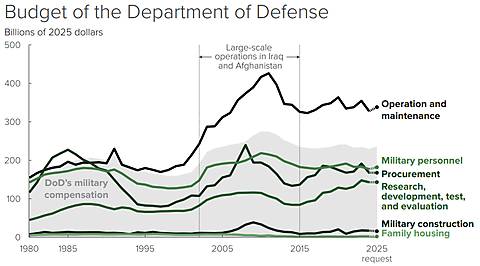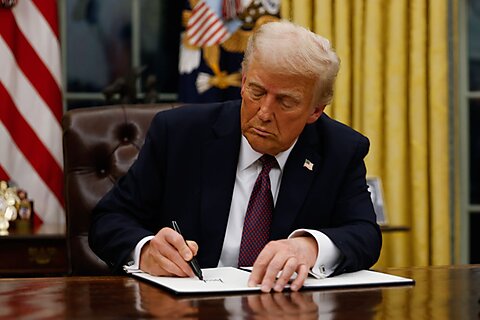In a remark that might seem to sum up Congress’s current approach to its oversight role, Sen. Thom Tillis (R‑NC) acknowledged the other day that the Trump administration’s opening moves to cut spending and do away with agencies without congressional approval were in some cases not lawful, but said, “Nobody should bellyache about that.” In particular, he said, “That runs afoul of the Constitution in the strictest sense. But it’s not uncommon for presidents to flex a little bit on where they can spend and where they can stop spending.” (I briefly summarized the ongoing lawbreaking spree in this space on Monday, and further likely illegalities have come to light since then.)
One group of thinkers who were given to bellyache when officials acted in unconstitutional ways were the framers of the Constitution, who had in recent memory the “long train of abuses and usurpations” committed in the name of the British crown. To guard against a repeat, they provided in Article II, Section 1, that the president take the following oath: “I do solemnly swear (or affirm) that I will faithfully execute the office of President of the United States, and will to the best of my ability, preserve, protect and defend the Constitution of the United States.” In Article VI, along with declaring that the Constitution “shall be the supreme law of the land,” they provided that Sen. Tillis, along with all his legislative colleagues, “be bound by oath or affirmation to support this Constitution.”
A lot of good that seems to have done.
These days both presidents and lawmakers tend to follow what I’ve called the goalie theory of constitutional enforcement, in which their team gets to take as many shots at the opponents as it can manage without bothering much about which may be constitutional and which not, “and the courts as goalies then block what shots they can.” If you buy into this theory, it can even seem mysterious and self-defeating for lawmakers or presidents to get all agonized about whether what they’re signing is constitutional. Don’t they know that’s the job of the courts?
If the Framers adhered to the judiciary-as-goalie theory, it’s not easy to see why they would have made a point of binding the other two branches with oaths to support the Constitution or what they expected the oaths to accomplish. The fact is that taking a step as president that one knows violates the Constitution, or voting as a member of Congress for a bill one knows to do so, looks very much like a violation of one’s oath.
This may shed some light on one argument heard in some quarters lately, which is that the incoming administration, influenced perhaps by some of its techie supporters, has decided to “move fast and break things.”
We can all recall instances of tech innovations that ignored possible legal obstacles and then proved their worth. Could sharing apps or social media have gotten off the ground without seeming to disregard some laws relating to unlicensed local business practices or the use of copyrighted material? The theory, when it works, is that the industry or service newly created is so useful and valuable that the law will bend to accommodate it, heeding the clamor of satisfied users who don’t want to go back to the old ways.
Perhaps those moving fast and breaking things in the new administration believe that what they are doing won’t be reversed, even should the law catch up with them. The public will be delighted at the changes, a grateful Congress will pass new bills retroactively blessing the irregular measures taken, and so forth. Another, not quite as sunny, possibility is that the unlawful moves will translate into facts on the ground that simply cannot be reversed whether or not the public winds up happy.
Federal prosecutors and FBI agents fired contrary to civil service laws may eventually prevail in court, but many will have found other jobs in the interim and not care to come back. Improperly deported persons will in many cases settle into life abroad and not return, even if a court a year from now says they can. A nonprofit that misses payroll, because its research or social service grant was cut off without warning, may simply close its doors and never return to claim the grant.
It’s worth remembering, however, one crucial difference between business start-ups and incoming public officials when it comes to moving fast and breaking things: the start-ups were never sworn to a public oath to put the law first. Thus, an ambitious delivery business may tell its drivers to double-park when they feel the need, reasoning that the income from conducting speedy business will more than pay for the occasional ticket. Officials are in a different station entirely. Their oath reminds them that respecting the Constitution, and with it the laws enacted thereunder, is very much their responsibility, even if they could more speedily accomplish some worthwhile objectives otherwise.
If we’re not going to take the oath of office seriously, maybe it’s time to amend the Constitution so as to formally do away with it.






















